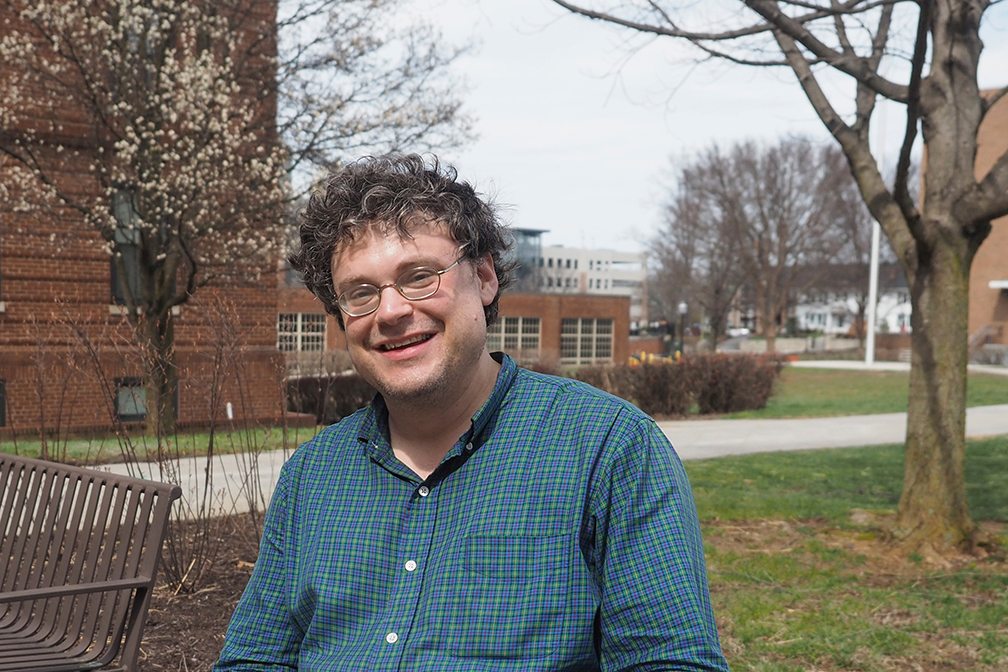Alexander Dickow Receives Prestigious Grant for French Poetry Translation
April 8, 2018

The words create instant visuals. One imagines the clandestine African migrants traveling in small, unreliable vessels across the Mediterranean in search of a better destiny. This may sound like a story on the evening news, but with Alexander Dickow’s 2018 PEN/Heim Translation Fund Grant, the tale of desperate travels is poetry.
Dickow, an associate professor of French in Virginia Tech’s Department of Modern and Classical Languages and Literatures, was first drawn to the work of French poet Sylvie Kandé in 2012. After meeting Kandé a year later, when she presented a guest lecture at Virginia Tech, he embarked on the translation of her epic poem Neverending Quest for the Other Shore: An Epic in Three Cantos.
“The inspiration to translate comes from the impulse to share a work you think is significant and meaningful,” he said.
Kandé’s heroic verse narrative compares the plight of African migrants to the historic legend of a ruler of 14th-century Mali. The tragic quest of Abubakar II to find the edge of the world ended with the disappearance of his ship’s fleet.
After feeling the power of Kandé’s words, Dickow wanted to help her broaden her audience. He applied for the PEN/Heim translation grant as a way to attract publishers for its eventual publication.
“Alex is making that poetry available to those who don’t know French or don’t know it well enough to understand the language of poetry,” said Jacqueline Bixler, Alumni Distinguished Professor of Spanish and chair of the Department of Modern and Classical Languages and Literatures. “He is a very talented and accomplished translator of French poetry.”
According to Dickow, translations help propel epic poetry into prominence. He cites Aimé Césaire’s Notebook of a Return to the Native Land as an example of this phenomenon. The poem achieved international fame through its translations into Spanish and English in the 1940s before it became widely known in France.
Dickow hopes his translation of Kandé’s poem will, in addition to an earlier German translation, make a big impression in the United States and France.
“There’s no equivalent to a work like this in French,” he said. “It’s an epic. It’s in verse. It has a clear narrative arc. It isn’t about personal experience but collective experience.”
In her original book, the poet imagines an alternative history for Abubakar II and his company of ships. She weaves his story together with the modern tale of African migration into a manifesto of heroism by the oppressed.
An excerpt from his project with Kandé was a runner-up in Asymptote Journal’s Close Approximations Translation Prize. He credits this journal as the first literary presence to recognize the poem as a promising work of translation.
One of only a dozen PEN/Heim translation grantees, Dickow has five years to complete this project. PEN America — part of PEN International, an organization that champions literature and human rights to protect open expression — sponsors the award.
Dickow’s desire to delve into the deep waters of translating another’s work stems from his own passion for writing poetry. He is the author of Caramboles, a collection of poems in French and English, and Le Poète innombrable: Cendrars, Apollinaire, Jacob, a book on three other French poets. His forthcoming book, Appetites, will be published by MadHat Press.
After earning a bachelor’s degree in French from Reed College, Dickow earned a master’s degree from Rutgers University and then a doctorate, also in French, from Rutgers and Université Paris 8.
Written by Leslie King





